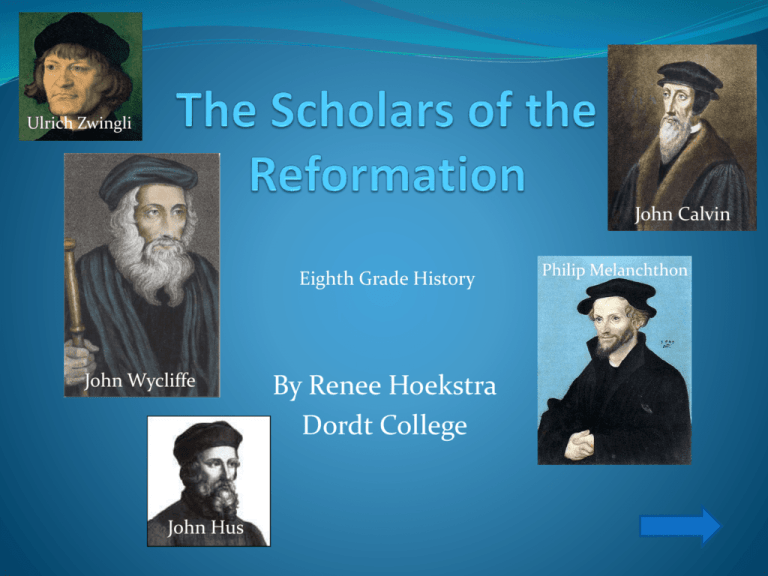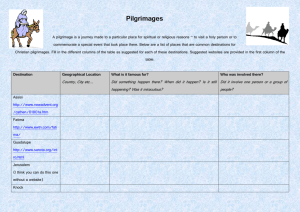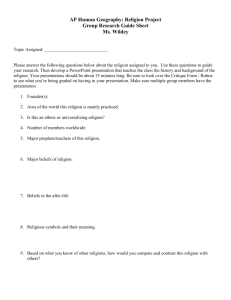The Scholars of the Reformation
advertisement

Ulrich Zwingli John Calvin Eighth Grade History John Wycliffe John Hus By Renee Hoekstra Dordt College Philip Melanchthon Introduction Martin Luther The Reformation was a pivotal point in the history of Christianity. Though the Reformation is often viewed in accordance with Martin Luther, several theologians were responsible for contributing to the Reformation and its outcome. In this activity you will be able to become more familiar with six of the Reformers and their basic beliefs. Task The students will split into six groups and each group will be assigned a reformer. The groups will then research the beliefs of the reformer on the websites provided. After they have found the beliefs, the students will then put together a poster describing the beliefs that that Reformer has along with some art that enhances the beliefs, such as bread and a wine cup for beliefs dealing with communion. After all the groups are finished they will each present before the class and describe the various beliefs using their posters. The listening students should take notes on the presentations as this information ought to be used on a test. Process Your group will be assigned one of the reformers below and you will have to research that reformer by going to the website listed. You will need to find what the major doctrines are that each reformer taught. After you have found the information, put it all together on an artistic poster that you will then present to the class. Take care to correctly present the beliefs as you and your classmates will be tested on the information. Reformers: John Calvin - http://www.newadvent.org/cathen/03195b.htm Martin Luther - http://www.newadvent.org/cathen/09438b.htm Ulrich Zwingli - http://www.newadvent.org/cathen/15772a.htm John Wycliffe - http://www.newadvent.org/cathen/15722a.htm John Hus - http://www.newadvent.org/cathen/07584b.htm Philip Melanchthon - http://www.newadvent.org/cathen/10151a.htm Evaluation Category and Score Beginning Participation The student does not contribute to the research portion but rather relies on others, and does not help to create the poster. The student goofs off during the time given to work. Research Developing Exemplary Accomplished The student gives some ideas but goofs off quite a bit and does not contribute very much The student contributes and finds useful things but does not stay on task the entire time given to work. The student is diligent and stays on task the entire work time. He is constantly contributing and offering new ideas. The group found only one belief and did not even elaborate upon it. The group was looking at other things and not working on the task at hand. The group found one belief but did not elaborate upon it fully. They did not make use of the resources they had. The group found several beliefs but did not elaborate upon them. The group found all the beliefs they could and elaborated as much as they could, even working outside of class to find more information. Poster The poster has no artistic work and is only the bare minimum of information. The poster has the information required but no artistic work. The poster has all the information but minimal artistic work. The poster has all the information needed and plenty of artistic work. Presentation The group provided only one belief and did not explain it to the class so they could understand. The group provided only one belief but they explained it fully. The group provided several beliefs and briefly explained them. The group provided multiple beliefs and explained them fully in terms the class could understand. Conclusion Now students will have a better understanding of the Reformers and perhaps will be able to see where the beliefs of their particular denomination found their roots. The students will also have worked upon their artistic abilities and will know how to find information on a website and put it into their own words. They will also have practice with public speaking and giving presentations before an audience. Teacher Page Focus: This webquest focuses on the people who contributed to the Reformation and informs students of the different beliefs that contributed and grew out of the Reformation and the years afterwards. Objectives/Goals: To learn about the beliefs that inspired the Reformation To practice researching topics on the internet To encourage create tendencies in students via the poster Resources: Time Required: three days: one for research, one for preparing posters, one for presentation. Each group will need access to a computer with the internet and a copy of this webquest. Credits Thank you to the Roman Catholic Church for their online encyclopedia.







